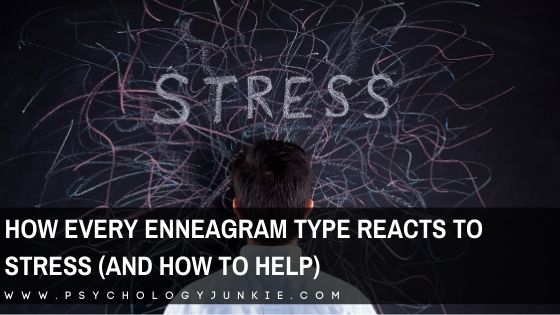How Every Enneagram Type Reacts to Stress, and How to Help
Have you ever become so stressed that you “flipped a switch” and acted like someone else? Maybe it felt like an out-of-body experience or you felt completely beyond your own control? Well, according to the enneagram system, there’s a reason for that! Each type has an area of disintegration (stress) that they veer into when they become especially stressed, but before that time happens, there’s also a sequence of unhealthy behaviors or feelings that may occur. That’s what we’re going to explore today!
Not sure what your enneagram type is? Take our new personality questionnaire here!


Sources: The Wisdom of the Enneagram, Personality Types: Using the Enneagram for Self-Discovery. These links are affiliate links. This means that if you purchase one of these eBooks, I get a small commission to help run my site.
Table of contents
Estimated reading time: 16 minutes
How Every Enneagram Type Reacts to Stress, and How to Help
Enneagram 1 in Stress
What stresses out the One Enneatype?
- Being around lazy or undependable people.
- Not seeing action taken towards a goal.
- Shame over mistakes they’ve made.
- Not living up to their own expectations.
- Others not living up to their expectations.
- Feeling like they have to be the responsible one while others are slacking.
- Being taken for granted
- Corruption in the world
- Hypocrisy
- Apathy
- People being late
- Messy surroundings
- Their Own Perfectionism
Normally grounded and pragmatic, Ones under stress suddenly become moody and withdrawn. They’re often burned out by trying to live up by their ever-increasing expectations, and this exhaustion leads to resentment and anger. However, because Ones are always trying to repress their anger, it leaks out into irritated comments, sarcastic jabs, or cynical jokes. If stress is extreme, Ones lose their usual self-discipline and become more hostile, withdrawn, and emotionally reactive. They might overeat, break some of their own rules, or throw caution to the wind. It’s as if they’ve fired their “inner critic” and, for a moment, are letting loose a rebel that was always hiding in the corner. They become more self-indulgent, self-conscious, and dramatic.
How to Help a One Experiencing Stress:
- Let them have an outburst. Just be with them. Don’t judge.
- Take on some of the responsibilities around them without having to be asked.
- Acknowledge the hard work they’ve put forth on a goal.
- Thank them for the things they’ve done for you.
- Give them some time alone to decompress.
- Realize that they might be especially moody and critical. Try to be patient.
- Let them know that they aren’t responsible for everything. Give them a break from some of their responsibilities.
- Clean up the house or the area they’re in. Give them a sense that things are in order.
- Remind them that nobody is perfect and everyone makes mistakes if they’re being self-critical.
- After they’ve had a chance to calm down, give them something safe to play at. Watch a comedy with them, get them outside, or make them laugh.
Enneagram 2 in Stress
What Stresses Out the Two Enneatype?
- Being taken for granted
- Too much time alone
- Feeling unloved for who they are
- Saying “yes” to too many things and burning themselves out
- Not getting affirmation or gratitude for their kind deeds
- Feeling left out
- Being around emotionally distant people
- Not having their kindness reciprocated
- Not feeling needed
The core desire of the two is to feel loved for who they truly are. These types need to nurture themselves as much as they nurture others, but often they overextend themselves on others’ behalf. They hope that through selfless pursuits they will earn a sense of worth and love. When these types are severely stressed they become more blunt and aggressive. Usually kind-hearted and gentle, they suddenly reveal a shocking inner toughness. They will confront people directly for their misdeeds and won’t hold back in arguments that they’d normally shy away from. This fiery resolve and directness is usually shocking to people who are used to their normal gregarious, empathetic demeanor. While this is happening, Twos become more concerned with their survival. They’ll work harder and become more controlling of the world around them.
How to Help a Two Experiencing Stress:
- Show them you care and acknowledge the kind things they have done.
- Help them set healthy boundaries so that they don’t keep overextending themselves.
- Remind them that they don’t need to worry so much about what other people think of them. Remind them of who their loyal friends and loved ones are – and that it’s okay not to be “perfect.”
- Realize that they might be more confrontational and aggressive than usual. Understand that this is temporary, and try not to judge too harshly unless they are endangering someone.
- Ask them if they want to vent, write down their feelings, or listen to a particular song to find a mirror for their feelings.
- Help them find creative modes of self-expression like drawing, singing, or writing.
- Tell them that it’s not selfish for them to take care of themselves and spend time on their own pursuits.
- Help them cancel some of their non-essential obligations.
Enneagram 3 in Stress
What Stresses Out Enneagram Threes:
- Not seeing progress towards a goal.
- Feeling like a failure.
- Feeling incompetent or being around incompetence.
- Not being acknowledged for what they do.
- Not accomplishing things.
- Losing.
- Comparing themselves to others who are highly successful.
- Feeling worthless or undesirable.
- Not being challenged.
- Being around people who lack vision.
Highly-focused and driven to succeed, Threes often burn themselves out trying to be the best at whatever they do. Not afraid of a challenge, they enjoy proving themselves and standing out amid a crowd of mediocre individuals. However, when they are highly stressed they can push themselves way too hard and punish themselves too viciously for their failures. When extreme stress hits, they can suddenly flip a switch and become more listless and apathetic. They fill their time with busywork to try to avoid facing the reality of the problems they’re dealing with. Instead of actually doing anything, they may get caught up in fantasies of their next big success. They also may feel more hyper-sensitive than usual, but will avoid facing their feelings directly. These stress episodes are confusing for them and their loved ones because they’re typically so hard-working and ambitious.
How to Help a Stressed-Out Three:
- Let them take off their “mask” of competence and capability. Patiently let them talk about what’s bothering them or give them time alone to decompress.
- Help them take deep breaths and tune into their body. Are they hungry? Thirsty? Tired? In pain? Help them recognize their physical needs.
- Encourage them (non-forcefully) to talk about their feelings. Remind them that you’re there to listen, not to judge. Give them a safe space to express their vulnerabilities without judging, offering advice, or coddling them. Simply listen.
- Be authentic about your own vulnerabilities – this will help them to feel safe being vulnerable with you.
- Draw their attention towards a creative avenue. Creative activity often helps Threes tremendously. Give them time to write, draw, listen to music, etc,.
- Acknowledge their successes and how they’ve helped you.
- Try to clean any messes in their surroundings. Disordered external surroundings tend to stress them.
Enneagram 4 in Stress
What Stresses Out Enneagram 4s:
- Having to go along with the crowd.
- Too many external pressures.
- Feeling misunderstood or criticized.
- Being micro-managed.
- Being forced to follow a lot of rules and guidelines.
- Not making progress on their creative goals.
- Having to put on a “happy face” when they are struggling emotionally.
- Having their feelings dismissed.
- Living in dull, non-personalized surroundings.
- Feeling creatively blocked.
Imaginative and melancholy, Fours believe in being deeply authentic and finding their unique identity in the world. They hate feeling forced into a box or unable to express their true feelings and ideals. When stressed, Fours tend to isolate themselves and brood over their negative feelings. They dwell on the darkness of their emotions and allow those feelings to engulf them. If stress increases to an extreme level, they may suddenly change and become more outgoing and anxious for human interaction. They might try too hard to please others or find ways to get closer to people. They will seem more needy, expressive, and people-pleasing. They crave affirmation and are terrified of being abandoned or rejected. They will try to help others in order to regain a sense of being needed by the ones they love.
How to Help a Stressed-Out Four:
- Allow them to express their feelings. Don’t tell them how they feel or cut them off. Understand that their feelings are unique to them.
- Remind them of what’s real and what they can count on. Don’t minimize their feelings, but point out the reality of the situation while empathizing with them.
- Remind them of their talents and strengths.
- Help them set up some positive routines that will create a more peaceful atmosphere in their home.
- Set up healthy boundaries if they are regularly using you as an emotional dumping ground.
- Remind them of what’s positive in the present moment.
- Offer empathy before advice.
- Let them know that they are lovable regardless of how different they are from others.
Read This Next: 7 Struggles of the Enneagram 4 Personality Type
Enneagram 5 in Stress
What Stresses Out Enneagram 5s:
- Not getting enough alone time.
- Being “barged in on.”
- Feeling incompetent or incapable.
- Feeling too detached from the physical world.
- Physical malnutrition and neglect.
- Being overwhelmed by fears and dark thoughts.
- Not finding a niche for themselves.
- Feeling like life is meaningless.
- Extreme isolation and lack of connection.
Fives crave mastery in something that will set them apart from others. These types often grew up feeling misunderstood and lost in their families. They worried that they weren’t capable of handling whatever life hurled at them, and hoped that through mastery in a niche area they could feel competent. However, many Fives search endlessly for mastery and knowledge, only to get lost in theoretical analysis over real-world experience. Over time, they can become reclusive, detached, and anxious. Stress builds as they sense their growing detachment from reality and their own physical bodies. During regular stress, they try to get away from the world and narrow their focus on their niche interest. As stress builds, they become increasingly distractible. They may drink too much, binge eat, go to parties, clubs, and bars in search of an escape from their stress. They may seem especially aggressive and insensitive during these moments.
How to Help a Stressed-Out Five:
- Help them to quiet their mind. Guide them through deep breathing and help them relax their body.
- Help them tune into their body. Are they exhausted? Dehydrated? Hungry? In pain? Fives often detach from their physical needs under stress. Help guide them back to their bodies so that they can get physical peace.
- Get them involved in a healthy activity. Take a walk, jump on a trampoline, go to the zoo, practice martial arts. These activities can reduce stress tremendously.
- Remind them that you’ll be there for them regardless of whatever happens. Let them know that it’s okay to tell you about their needs and that it doesn’t make them “weak.”
- Recognize their accomplishments and unique abilities.
- Help them put their knowledge to the test in the real world when they’re feeling less stressed. The more they actualize their abilities the happier they will become.
- Let them feel their grief. Show that you are trustworthy. Don’t coddle them or overly sympathize. Just show that you are there for them and remind them not to swallow their feelings. Encourage them to express themselves so that they can find relief.
- Respect their need for privacy.
- Don’t interrupt them or barge in on them.
Read This Next: 7 Struggles of the Enneagram Five Personality Type
Enneagram 6 in Stress
What Stresses Out Enneagram Sixes:
- Undependable people
- Disorder in their environment
- Corruption or chaos in the world
- Not trusting themselves
- Not having a sense of community or support
- Getting lost in catastrophizing
- Feeling unsafe
- Lack of structure or clarity
- Burnout from over-committing and taking on too many responsibilities
- Not finding answers to their questions
- Wishy-washy behavior
- Having other people decide for them
- Feeling distrustful of people close to them
- Making mistakes
Hard-working and loyal, Sixes crave an environment of security, support, and structure. They like knowing what’s going to happen and when it’s going to happen. Natural catastrophizers, they prepare for worst-case scenarios and are vigilant to any potential disaster. Under stress, Sixes become hyper-aware of all that could go wrong. They become exceedingly anxious and envision horrific possibilities at every turn. They get lost in endless thoughts and negative possibilities and may get caught up in researching solutions or news stories that might provide answers. They may also seek an authority or guide to help them find the best way to handle the situation. If stress builds to extreme levels, they disintegrate to 3. When this happens, they become more image-conscious and focused on how they appear to others. They may put on a persona of professionalism and confidence, becoming boastful and self-promoting. Their work absorbs them and they become fixated on achievement. By being competitive and ambitious they hope they can assuage their low self-esteem and brutal anxiety.
How to Help a Stressed-Out Six:
- Remind them of what’s real and dependable.
- Ask them to assume the worst happens. Then what they will do? Letting them talk it out can help them to calm down and realistically assess the situation.
- Remind them that the worst could happen, but that the best could happen as well.
- Don’t patronize their fears.
- Follow through on your commitments and promises.
- Remind them that you’re there for them.
- Help them tune into their body. Guide them through deep breathing.
- Ask them to assess their physical needs. Are they hungry? Tired? Thirsty? Remind them not to forget their physical needs.
- Exercise with them or go for a walk. This can increase stress-reducing endorphins in the brain.
- Help them to calm the flurry of internal voices in their mind. Encourage them to listen to their heart and instincts.
- Make sure they’re getting time alone.
- Help them cancel non-essential responsibilities that are overwhelming them.
Enneagram 7 in Stress
What Stresses Out Enneagram 7s:
- Being micro-managed
- Not having enough personal freedom
- Lack of free, unstructured time
- Excessive responsibilities
- Being cooped up for too long
- Being stuck in one place for too long
- Boredom
- Doing nitty-gritty, detail work
- Financial problems
- Being stuck in a routine
- Lack of loyal friendships
Sevens are enthusiastic and innovative, finding possibility in even the direst situations. Because they’re so creative it’s typically easy for them to reframe a negative situation into a positive one. That said, they still experience stress just like everyone does. When Sevens are stressed, they become more escapist and impulsive. They’ll fixate on finding a fun activity or experience to pursue, and may become more hedonistic or scattered than usual. If stress builds to extreme degrees, they can disintegrate to One. When this happens, they restrain their normally free-spirited behaviors. They will work harder, educate people, and become more critical and judgmental. They may even scold, nitpick, or become sarcastic with people – noticing all their flaws and the flaws of others.
How to Help a Stressed Enneagram Seven:
- Help them to calm down and take deep breaths.
- Guide them through observing their feelings, both physical and emotional. They may dislike this initially and need some time alone first. It’s important for them to do this, though, either alone or with someone they can trust.
- Meditation can be very helpful for Sevens. Encourage them to stick with this, even if it seems boring.
- Encourage them to accept pain as well as pleasure. Help them to realize that pain is an integral part of life and will help them grow.
- Be supportive as they vent or try to deal with their grief.
- Give them delicious, healthy snacks to enjoy.
- Help them to find a song that mirrors their emotions and listen to it with them.
Enneagram 8 in Stress
What Stresses Out Enneagram 8s:
- Feeling out of control
- Being micro-managed
- Having to be a follower
- Having their autonomy infringed upon
- Not seeing progress towards a goal
- Failure
- Wishy-washy, vapid people
- Manipulative people
- Having to sugarcoat things
- Having to play it safe
- Being around corruption
- Not being challenged
Charismatic and strong-willed, Eights crave freedom and a sense of power in their world. They need independence, and any situation that takes that away from them can create an enormous amount of stress and anger. During stress, Eights become more confrontational than usual and can work harder, trying to achieve more independence and control in their lives. If stress builds to extreme degrees, Eights can suddenly become reclusive and withdrawn. They get stuck in analysis, reading, and info-gathering, trying to find subjects to master in an attempt to feel competent again. They may stop taking care of themselves physically and become more quiet and detached than usual.
How to Help a Stressed-Out Enneagram Eight:
- Prove that you are someone they can trust. Follow through on your promises and mean what you say.
- Give them some time to themselves to decompress and sort things out.
- Help them to tune into their breathing and calm their body.
- Remind them that it’s okay to let down their guard around you. Let them know this doesn’t make them “weak.”
- Let them know if they are intimidating you.
- Show them that progress is being made towards a goal.
- Be clear and direct with them, but understanding.
Enneagram 9 in Stress
What Stresses Out Enneagram 9s:
- Conflict in their environment
- Being with people who are making a “scene”
- Being forced into a position
- Being ignored or passed over
- Saying “yes” to things they don’t want to do
- Dealing with peer pressure
- Losing relationships that are important to them
- Suppressing anger for too long
- Having too many demands on their time
Nines crave inner harmony and peace. They want time to themselves to imagine, contemplate, and explore. They enjoy peaceful, harmonious environments and freedom. During stress, they try to downplay their own choices and needs in an effort to create inner peace as well as outer peace. They worry that by asserting themselves they will create more conflict, both inside and outside. They try to suppress their anger, fearing that it will fragment or destroy them in some way. If stress increases to extreme levels, Nines fixate on forming relationships and security. They worry about worst-case scenarios and become uncharacteristically pessimistic and paranoid. They might blame other people for their problems or bring up long-stifled complaints about others. Their normally serene nature cracks to reveal numerous anxieties and frustrations under the surface.
How to Help a Stressed-Out Nine:
- Give them permission to assert themselves and their needs. Ask them to “let it all out” and remind them that this is a judgment-free zone.
- Give them some space and time to themselves.
- Remind them that it’s okay to say “No” to things they don’t want to do.
- Recognize their unique talents and encourage them to pursue them.
- Help them process their anger. Remind them that anger isn’t always a bad thing. Use examples if possible.
- Help them tune into their bodies. What do they need physically? Help them to take deep breaths.
- Go for a jog with them or engage in some other form of exercise. This will help them to de-stress and process some of their feelings.
What Are Your Thoughts?
Do you have any suggestions for people with your enneatype? Let us know in the comments!
Find out more about your personality type in our eBooks, Discovering You: Unlocking the Power of Personality Type, The INFJ – Understanding the Mystic, and The INFP – Understanding the Dreamer. You can also connect with me via Facebook, Instagram, or Twitter!










I’m an INFP, and recently tested as a 4w5 on the Enneagram Test. I’ve read descriptions about the Type Four personality and feel that it suits me more than any other as far as a fundamental enneatype is concerned. I’ve also read about how Fours integrate into Ones under growth, but Ones disintegrate into Fours under stress. After reading this article, I still feel that Type Four matches me the best, but I also related a lot to the stressors of Type One, which confuses me a little since Fours disintegrate into Twos under stress (I also identified with the stressors of Type Two, which I guess is to be expected given this relationship between Four and Two). Is it possible for a Four to experience the same stressors of the One since unhealthy Ones equate to unhealthy Fours?
Type 1, Susan. Thank you for sharing. Kind of hit the spot.
Gilbert
I can’t remember what type I am from testing a while back, 4 or 5 maybe, but regardless, I feel stressed out by 95% of the things on every type’s list.
I am type 5w6 and the above descriptions about them are spot on, especially in feeling incompetent or incapable and being distrustful of people, especially of friends or close ones.
There wasn’t a section of what Not to do with type(___), but converting the Do’s to Don’t’s is usually straightforward.
As far Nine’s, though, one the worst things for a peacemaker/ protector to hear is ” you’re being silly/ paranoid/ you’re the one with the problem. ” Wait .. scrolling up .. yes, good to allow them safe space. But they need to know they are being listened to. The pearl harbor war film Tora Tora Tora ( ” you wanted confirmation? … (opens window ).” There! ..”) is their worst nightmare. If it be a personal matter, that the worst could happen and friends and family got the facts all wrong in the eulogy.
My support group thankfully is in accordance with your advice, and mostly the universe unfolds for the best, and I don’t catch fire in the process, love to my peeps.